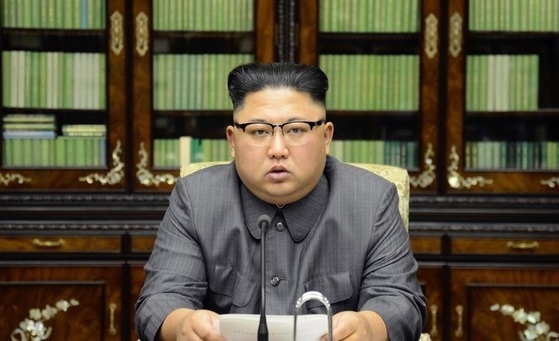North Korea’s release of key notifications around midnight -- including a notification on its participation in the PyeongChang Winter Olympics -- is calculated to ensure the US receives its messages, South Korean experts say.
 |
North Korean leader Kim Jong-un (Yonhap) |
As of Tuesday, North Korea had sent three messages within that timeframe, with the latest on late Sunday night announcing the North’s ceremonial head of state Kim Yong-nam’s visit to the Winter Games. The notifications last month were about canceling an advance team’s visit to the South and a joint event that was to have taken place at the North’s resort on Kumgangsan.
“When making key announcements, North Korea almost always takes the Washington time zone into consideration,” Koh Yu-hwan, a North Korea expert at Dongguk University, told The Korea Herald, underlining that it is all part of the North’s carefully planned strategy.
Koh mentioned the North’s decision to launch an intercontinental ballistic missile on July 4 last year as a sign that Pyongyang considers the US time zone or events in making major decisions. North Korean leader Kim Jong-un had taunted the US, saying the launch was a Fourth of July “gift” to President Donald Trump on the country’s Independence Day.
“Pyongyang also knows the general cycle of the South Korean and US media and has been making announcements usually on Sunday (to make headlines) in Monday editions of newspapers in both nations,” added Koh.
But the Seoul-based expert also added that North Korea’s decision-making process usually wraps up at night due to its political system and structure, in which its leader Kim Jong-un makes the final decision.
Kim has showed a pattern of finalizing such decisions at the end of the day, according to Koh.
Another expert said that such announcements are aimed at throwing the South Korean government off guard and eliminating chances of in-depth discussions on key matters between Seoul and Washington.
“With the fast-approaching PyeongChang Olympics, Seoul will have to make decisions linked to the North’s participation in the games as quickly as possible, and North Korea is making such late-night announcements to exploit the current situation,” said Choi Kang, vice president of research at the Seoul-based think tank Asan Institute for Policy Studies
Seoul recently made a late-night announcement saying it has decided to greenlight a North Korean ferry carrying the North’s 140-member Samjiyon art troupe to enter its waters.
South Korea’s unilateral sanctions ban North Korean vessels from calling on South Korean ports, but Seoul made a special exemption for an Olympic overture.
The US has been ramping up its pressure campaign against North Korea, but has agreed to support the South in bringing the North to the Olympics.
“The problem is (matters related to sanctions are very sensitive at the moment) and due to the lack of time to inform the US of the specifics, it’s becoming more of a notification than a proper discussion between Seoul and Washington. However, the common goal is to bring the North to the dialogue table and both sides (Seoul and Washington) understand bringing North Korea to PyeongChang is important,” Choi said.
By Jung Min-kyung (
mkjung@heraldcorp.com)








